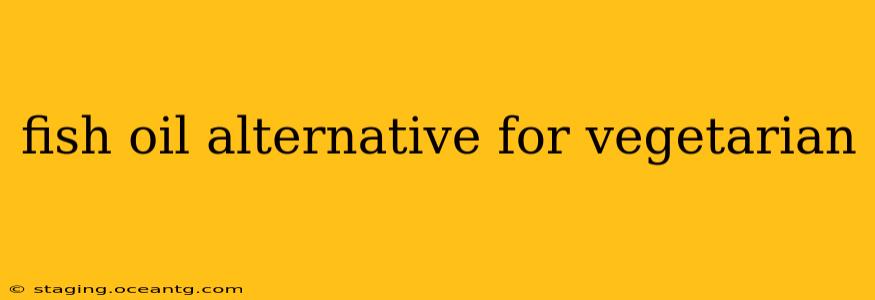For vegetarians seeking the health benefits of fish oil, finding suitable alternatives is crucial. Fish oil is prized for its high concentration of omega-3 fatty acids, EPA (eicosapentaenoic acid), and DHA (docosahexaenoic acid), vital for brain health, heart health, and reducing inflammation. While fish oil provides these directly, vegetarians need to look to plant-based sources to obtain these essential fatty acids. This guide explores effective alternatives and addresses common questions.
What are the Benefits of Omega-3 Fatty Acids?
Before diving into alternatives, let's understand why omega-3s are so important. These essential fatty acids are crucial for various bodily functions:
- Brain Health: DHA is a key structural component of the brain and is vital for cognitive function, memory, and mood regulation.
- Heart Health: EPA and DHA contribute to reducing triglycerides, blood pressure, and the risk of blood clots, all beneficial for cardiovascular health.
- Inflammation Reduction: Omega-3s possess potent anti-inflammatory properties, playing a role in managing conditions like arthritis and inflammatory bowel disease.
- Eye Health: DHA is crucial for maintaining the structure and function of the retina, promoting healthy vision.
What are the Best Vegetarian Alternatives to Fish Oil?
Vegetarians can obtain omega-3s through various plant-based sources, although they primarily contain ALA (alpha-linolenic acid), which the body converts to EPA and DHA, albeit at a lower rate than direct consumption. The best sources include:
- Flaxseed Oil: Rich in ALA, flaxseed oil is readily available and can be easily incorporated into your diet through salads, smoothies, or as a supplement. However, remember that conversion to EPA and DHA is limited.
- Chia Seeds: Similar to flaxseeds, chia seeds are packed with ALA and offer additional fiber and nutrients. They can be added to yogurt, oatmeal, or baked goods.
- Hemp Seeds: Another excellent source of ALA, hemp seeds provide a nutty flavor and can be used in various recipes or consumed as a snack.
- Walnuts: These nuts offer a good amount of ALA and other healthy fats. They can be enjoyed as a snack, added to salads, or incorporated into baking.
- Algae-Based Omega-3 Supplements: This is a direct source of EPA and DHA, bypassing the conversion process needed with ALA-rich foods. This makes it a highly effective vegetarian alternative to fish oil.
How Much ALA Do I Need to Convert to Sufficient EPA and DHA?
The conversion of ALA to EPA and DHA is highly variable and depends on individual factors. Research suggests that only a small percentage of ALA gets converted, making it crucial to consume substantial amounts of ALA-rich foods or consider supplementing with algae-based omega-3s directly providing EPA and DHA. Consult a healthcare professional or registered dietitian to determine your individual needs and the most appropriate approach.
Are Algae-Based Omega-3 Supplements Really the Same as Fish Oil?
Algae-based omega-3 supplements are not identical to fish oil, but they offer a comparable source of EPA and DHA without involving any animal products. Algae are the primary source of omega-3s in the food chain, consumed by fish. Therefore, algae-based supplements provide a sustainable and ethical alternative.
What are the Potential Side Effects of Vegetarian Omega-3 Sources?
Generally, the side effects of plant-based omega-3 sources are minimal. However, some individuals may experience mild digestive issues, such as diarrhea, when consuming large amounts of flaxseed oil or chia seeds. Always start with small amounts and gradually increase your intake.
Can I Get Enough Omega-3s from Diet Alone?
It's possible to obtain adequate omega-3s through diet alone, especially if you consume significant quantities of ALA-rich foods. However, achieving optimal levels of EPA and DHA might necessitate supplementing with algae-based omega-3s, especially for individuals with specific health concerns or those who don't readily consume enough plant-based sources of ALA. Again, consulting a healthcare professional is recommended.
By incorporating these plant-based alternatives and understanding their strengths and limitations, vegetarians can effectively ensure they meet their omega-3 requirements and reap the numerous health benefits associated with these essential fatty acids. Remember to consult a healthcare provider for personalized advice on your dietary needs.
